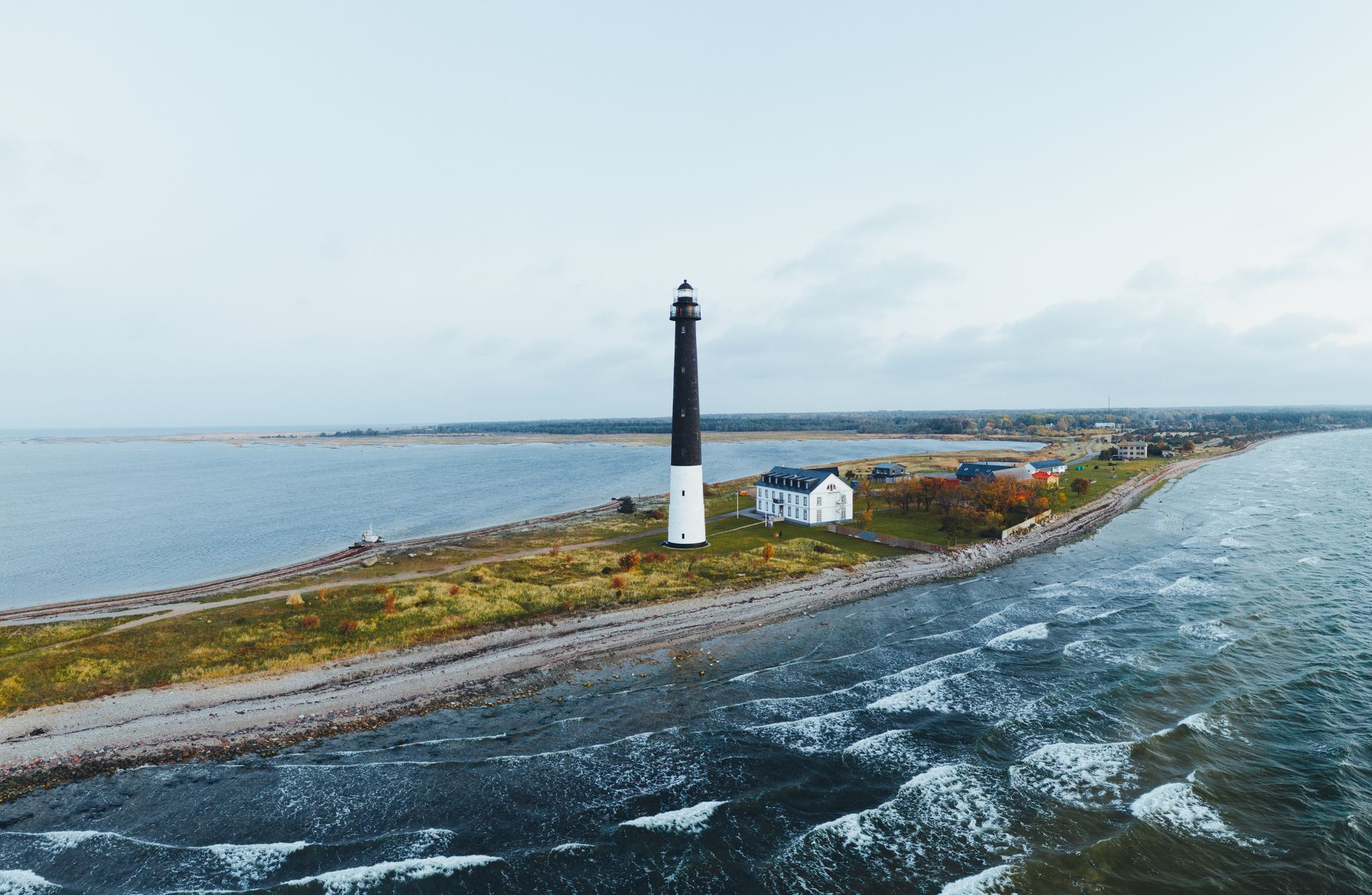
Island hopping- Muhu, Saaremaa and Hiiumaa
Example programme for travel professionals
Estonia has 2,317 islands.
However, very few of them are inhabited or easily accessible to visitors.They are quiet places for hiking, camping, exploring Estonia's rich coastal heritage, and enjoying local food.
Muhu is known for its timeless village ambiance and natural landscapes, which have remained unchanged for centuries. Distances between attractions are short, making it ideal for exploration by bicycle, horseback, or boat. Muhu Islanders have preserved their coastal culture from ancient times to today by advocating for ecological balance and promoting a nature-centric mindset.
How to get to Muhu Island: By ferry from Virtsu to Kuivastu port.
Estonia's largest island, Saaremaa, attracts visitors with its natural beauty, rich history, and cultural heritage. Here, you will find ancient spa resort traditions in the island's capital, Kuressaare, which has something to offer everyone, regardless of the season. Saaremaa is one of Estonia's top tourist destinations, attracting visitors from near and far.
How to get to Saaremaa: Take a ferry to Muhu Island from Virtsu to Kuivastu port and then drive to Saaremaa. For a quick and comfortable journey from Tallinn to Kuressaare, consider flying, which takes around 30 minutes.
Hiiumaa is the second-largest island in Estonia. What sets Hiiumaa apart from other Estonian islands? Its exceptionally clean, unspoiled natural beauty, as well as the close-to-nature and natural lifestyles preferred by its residents.
Unlike Saaremaa, you won't find modern spa centers or health resorts here because the island itself is like a spa, with plenty of summer sunshine, soothing sea waves, and long sandy beaches.
How to get to Hiiumaa: By ferry from Rohuküla to Heltermaa or the ferry line from Saaremaa (Triigi Port) to Hiiumaa (Sõru Port). For a quick and comfortable journey from Tallinn to Kärdla, consider flying, which takes around 30 minutes.

Photo author: Priidu Saart
DAY 1: Island Muhu and Saaremaa
Head to the islands! Estonia's largest island, Saaremaa, attracts visitors with its natural beauty, rich history and cultural heritage.
Start the bus drive from Tallinn to Virtsu harbour. Enjoy approx. 2-hour drive to the Western Estonia
Ferry from Virtsu to Kuivastu, approx 30 minutes. Taking a ferry is the most convenient way to tour local islands.
Welcome to Muhu island! On Muhu Island, nature and ancient traditions weave a unique tale, one which has not changed much over time.
Lunch at Luscher & Matiesen Muhu Winehouse, the world’s northernmost wine tourism farm.
Canoe trip at Laidevahe nature reserve
Arrive to Pilguse Residency, based at the Pilguse Manor House which dates back to 1558 and is set in an absolutely gorgeous and unique 90 hectares of land. High end accommodation and dining, experiences to explore and relax in the local Estonian nature.
Dinner and smoke sauna experience

Photo author: Hans Markus Antson
DAY 2: Island Saaremaa
Breakfast, check-out
Visit to Sõrve lighthouse, located at the tip of Sõrve Peninsula.
Lunch at Saaremaa Veski, located in a unique windmill in Kuressaare (from 1899).
Walking through the Kuressaare old town
Visit to Kuressaare castle, one of the most interesting and best-preserved fortresses in Estonia.
Juniper treatment at GOSPA. Juniper is a gift from nature to be found in island Saaremaa. Check out other treatments as well!
Visit to Angla Windmills, with historical agricultural machines and during the summer season, with several farm animals and birds. Dinner included.
Short drive to ferry harbour (10 minutes)
Evening ferry Triigi-Sõru (1 hour)
Welcome to island Hiiumaa! Estonia's second-largest island is home to less than ten thousand people.
20 minutes drive to Dagen Haus Guesthouse, next to the seaside, in the old granary of Orjaku manor
Check-in and overnight

Photo author: Robert Lindström
DAY 3: Island Hiiumaa
Breakfast at hotel, check-out
Guided walk to Orjaku birdwatching tower
Visit to Hiiu Gourmet, small producer from Hiiumaa, who captures the gifts of Hiiumaa’s forests and meadows in tea bags.
Family business introduction at Vaemla Wool Factory with the oldest wool processing machines.
Wreath weaving and natural beauty products in northernmost lavender field in the world.
Lunch at Rannapaargu restaurant, located on Kärdla Beach
After lunch quick stop to take Artesian water- the groundwater, that bursts out like a fountain.
Seal observation trip with the picturesque Hiiumaa coastline (depending on weather conditions from April to September)
Short introduction to Hiiuihuhooldus – Natural Spa and Sauna Products from Hiiumaa at Pähkli Primeval Hut
Before departure, stop at Heltermaa Handicraft House, the largest and most attractive handicraft shop at Heltermaa Harbour, at the gates of Hiiumaa, in a former tavern.
Evening ferry Heltermaa-Rohuküla to mainland (1 hour 15 minutes).
Optional overnight stay in Haapsalu or 1.5 hrs drive to Tallinn

Photo author: Tatiana Metsala
DAY 4: Optional romantic town Haapsalu
Haapsalu is the perfect destination for families, couples looking for romance, and health enthusiasts alike.
Haapsalu is famous for its mud baths and spa treatments, attracting visitors seeking relaxation and wellness. Try out Hestia Hotel Haapsalu Spa treatments
Walk through the promenade
Visit Haapsalu Castle, one of the best-preserved castles in Estonia and home to the most famous ghost in Estonia – the White Lady!
Short visit to Haapsalu Lace Center to see the Haapsalu Shawl – an ultra-fine woolen knit so delicate it can pass through a lady’s ring – has been a symbol of Haapsalu since the last century.
Enjoy minitrain ride through the city
Lunch options: Cafe-Restaurant Hapsal Dietrich, Wiigi cafe or Haapsalu kuursaal
Introduction to Haapsalu art, step in to Epp Maria Gallery and Okase Museum, world-renowned Estonian art classic.
Drive back to Tallinn, approx 1.5 hours

Photo author: Rivo Veber
Last updated
24.10.2025